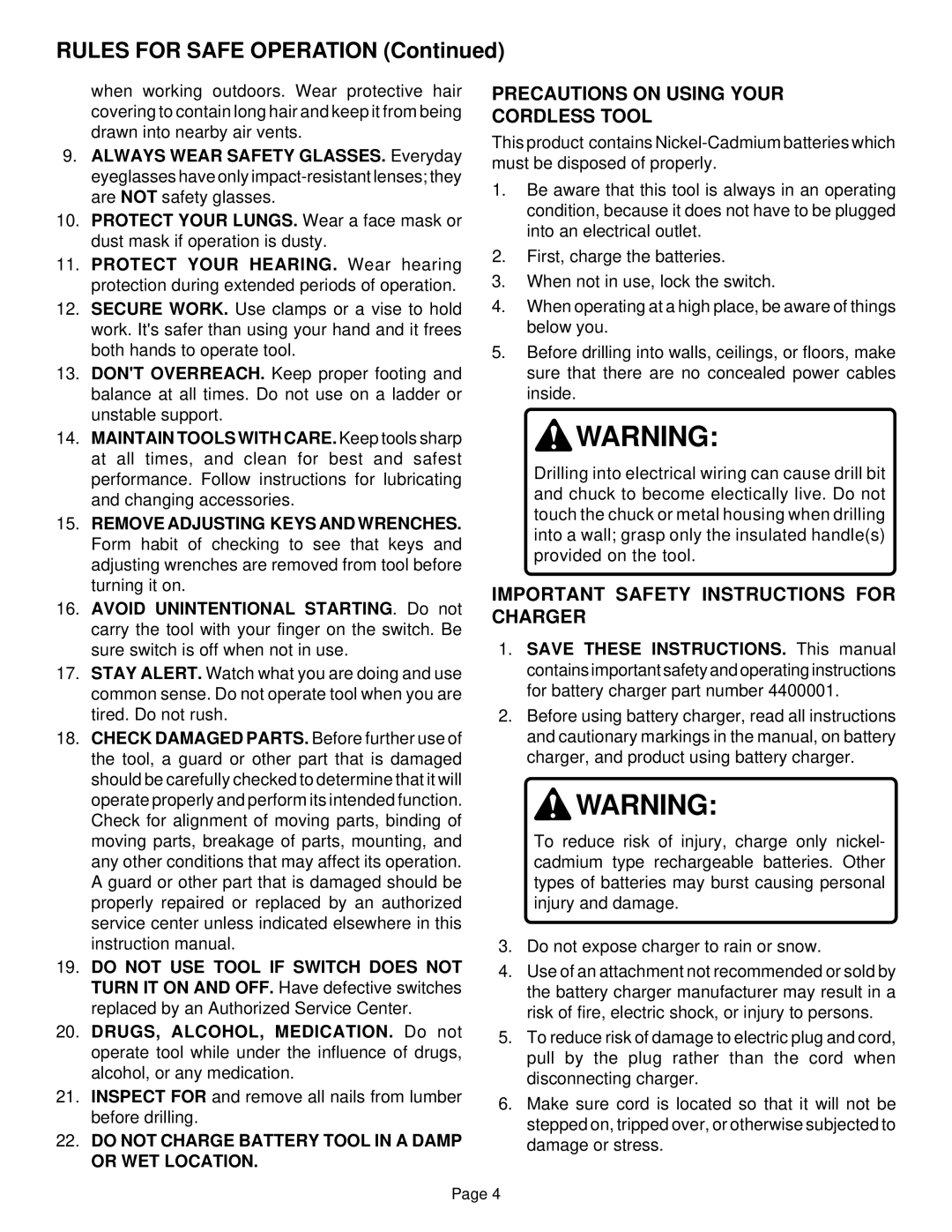
RULES FOR SAFE OPERATION (Continued)
when working outdoors. Wear protective hair covering to contain long hair and keep it from being drawn into nearby air vents.
9.ALWAYS WEAR SAFETY GLASSES. Everyday eyeglasses have only
10.PROTECT YOUR LUNGS. Wear a face mask or dust mask if operation is dusty.
11.PROTECT YOUR HEARING. Wear hearing protection during extended periods of operation.
12.SECURE WORK. Use clamps or a vise to hold work. It's safer than using your hand and it frees both hands to operate tool.
13.DON'T OVERREACH. Keep proper footing and balance at all times. Do not use on a ladder or unstable support.
14.MAINTAIN TOOLS WITH CARE. Keep tools sharp at all times, and clean for best and safest performance. Follow instructions for lubricating and changing accessories.
15.REMOVE ADJUSTING KEYS AND WRENCHES. Form habit of checking to see that keys and adjusting wrenches are removed from tool before turning it on.
16.AVOID UNINTENTIONAL STARTING. Do not carry the tool with your finger on the switch. Be sure switch is off when not in use.
17.STAY ALERT. Watch what you are doing and use common sense. Do not operate tool when you are tired. Do not rush.
18.CHECK DAMAGED PARTS. Before further use of the tool, a guard or other part that is damaged should be carefully checked to determine that it will operate properly and perform its intended function. Check for alignment of moving parts, binding of moving parts, breakage of parts, mounting, and any other conditions that may affect its operation. A guard or other part that is damaged should be properly repaired or replaced by an authorized service center unless indicated elsewhere in this instruction manual.
19.DO NOT USE TOOL IF SWITCH DOES NOT TURN IT ON AND OFF. Have defective switches replaced by an Authorized Service Center.
20.DRUGS, ALCOHOL, MEDICATION. Do not operate tool while under the influence of drugs, alcohol, or any medication.
21.INSPECT FOR and remove all nails from lumber before drilling.
22.DO NOT CHARGE BATTERY TOOL IN A DAMP OR WET LOCATION.
PRECAUTIONS ON USING YOUR
CORDLESS TOOL
This product contains
1.Be aware that this tool is always in an operating condition, because it does not have to be plugged into an electrical outlet.
2.First, charge the batteries.
3.When not in use, lock the switch.
4.When operating at a high place, be aware of things below you.
5.Before drilling into walls, ceilings, or floors, make sure that there are no concealed power cables inside.
![]() WARNING:
WARNING:
Drilling into electrical wiring can cause drill bit and chuck to become electically live. Do not touch the chuck or metal housing when drilling into a wall; grasp only the insulated handle(s) provided on the tool.
IMPORTANT SAFETY INSTRUCTIONS FOR CHARGER
1.SAVE THESE INSTRUCTIONS. This manual contains important safety and operating instructions for battery charger part number 4400001.
2.Before using battery charger, read all instructions and cautionary markings in the manual, on battery charger, and product using battery charger.
![]() WARNING:
WARNING:
To reduce risk of injury, charge only nickel- cadmium type rechargeable batteries. Other types of batteries may burst causing personal injury and damage.
3.Do not expose charger to rain or snow.
4.Use of an attachment not recommended or sold by the battery charger manufacturer may result in a risk of fire, electric shock, or injury to persons.
5.To reduce risk of damage to electric plug and cord, pull by the plug rather than the cord when disconnecting charger.
6.Make sure cord is located so that it will not be stepped on, tripped over, or otherwise subjected to damage or stress.
Page 4
